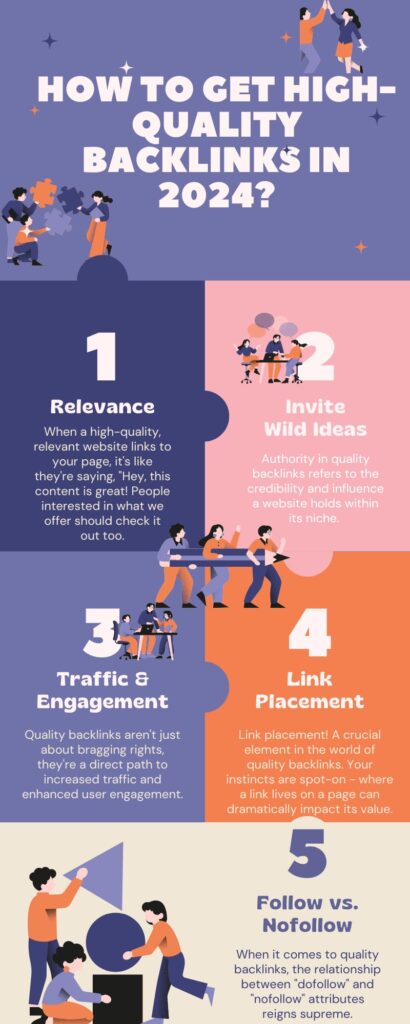What are quality links in SEO?
In the changing world of SEO, having good links is always important for your website. But not all links are the same. A few really good links are better than lots of not-so-great ones. So, what makes a link really good, and how can you get them?
There are a few things that make a link better such as Relevance, Authority, Traffic and engagement, Link Placement, Follow vs. Nofollow, Building Good Links, Creating great content, Guest blog, Connect with your community, Fixing broken links, Joining online groups, etc

What are the 3 types of backlinks?
Knowing about different kinds of backlinks is important for creating a good link profile that can enhance your website’s authority and visibility.
Now, let’s look at the three main types of backlinks and see how they can affect your SEO:
- Editorial Backlinks:
Editorial backlinks are earned naturally through genuine mentions from other websites. This usually happens through:
- Contributing high-quality content to relevant websites.
- Being cited by other websites for your research or insights.
- Getting positive reviews and testimonials on reputable websites.
2. Relationship-Based Backlinks:
Building connections with other website owners and industry influencers can lead to valuable backlinks. This might involve:
- Collaborating with other websites on projects.
- Networking with bloggers, journalists, and relevant individuals.
- Sponsoring events or advertising on relevant websites.
3. Dofollow vs. Nofollow Backlinks:
Though not exactly a “type,” the “follow” attribute is crucial. Backlinks can be either “dofollow” or “nofollow”:
- Dofollow backlinks pass on link juice to your website, impacting your search engine ranking.
- Nofollow backlinks do not pass on link juice but can be valuable for branding and referral traffic.
What are the Low-Quality Backlinks?
Backlinks make your website more visible and higher in ranking. However, there are some bad backlinks that can harm your website. These unhelpful links not only do not push your website forward but can also bring it down, causing problems for your SEO.
So, how do you deal with this issue and find these unwanted hitchhikers?
Signs of Bad Links:
- Not Related: Links from websites completely unrelated to your topic. They do not help in navigation and look like spam to search engines.
- Not Strong: They don’t provide much support and can harm your SEO efforts.
- Spammy Sites: Links on suspicious websites with malware, gambling, or adult content are like traps leading you to dangerous places. Search engines don’t like such connections.
- Unnatural Patterns: Suddenly getting many links from unknown sources or having too many links with the same text are signs of manipulative tactics that can lead to penalties.
- Broken Links: Links that go nowhere or lead to error pages are like useless anchors – they provide no support and leave users and search engines frustrated.
How to Deal with Bad Links:
- Regular Checks: Use tools to regularly check your website for suspicious links.
- Get Rid of Bad Links: Once you find bad links, let search engines know you do not want to be associated with them using tools like Google Search Console.
- Natural Links: Focus on getting good links organically through creating valuable content, guest blogging, and interacting with relevant communities. Quality is more important than quantity.
- Build Trust: Prioritize links from trustworthy websites in your field.
How Much Do Quality Backlinks Costs?
In order to improve visibility in Google Search Engines, getting good links to your website is really important. These links can help your site rank higher, get more visitors, and, in the end, make your business more successful. But, just like anything valuable, these links can be expensive. So, how much do these special links really cost?
Firstly, let’s clear up a misunderstanding that there’s no fixed cost for everyone. The price of a good link depends on different things, such as:
- How popular the website is: A link from a big and well-known website like The New York Times will cost more than one from a local sblog.
- Where the link is on the page: A link in the main part of the page is more valuable than one at the bottom.
- How relevant the link is: A link from a website about the same topics as yours is better than a link from a random directory.
- How you get the link: Doing things like reaching out to people or writing guest blog posts takes time while buying links can be quicker but riskier.
Now, let us make it simpler:
- Natural Strategies: Free but takes time. You will need to spend a lot of time creating good content, building relationships, and reaching out to others. It is not something that happens quickly.
- Reaching Out & Guest Blogging: This can be free (if your content is good) or cost a few hundred dollars for a link on a popular website.
- Buying Links: The cost can be very different, from cheap $5 packages to expensive campaigns costing thousands. Just remember, cheap links might not be good for your site’s ranking on Google.
Even if a link is expensive, it might not be worth it if it doesn’t match your audience or the topics on your website. A single link from a local blog that talks about the same things as your website could bring more valuable visitors than ten links from random websites.
How Many Backlinks You Should Create per day?
Many believe that having a specific number of daily backlinks will place their website at the top of search engine results. However, the truth is that focusing on the quantity of backlinks can lead to disappointment and potential SEO issues.
Instead of fixating on a daily number, we must consider something more valuable and that is quality backlinks. These are not just any links, they are like partnerships, connecting with trust and relevance, guiding potential customers straight to your website.
Why Quality Backlinks are Important?
- Authority Matters: A single backlink from a high-authority site holds more value than many from low-quality directories. Aim for links from respected websites in your niche.
- Relevance is the Key: Relevance ensures your message reaches the right audience for maximum impact.
- Naturalness Wins: Google dislikes unnatural backlink patterns. Building a steady flow of high-quality backlinks over time, resembling organic growth, signals legitimacy and avoids penalties.
So, how many quality backlinks should you aim for?
The answer is not fixed. It depends on factors like your website’s age, niche competitiveness, and content quality. Instead of worrying about daily quotas, focus on these strategies;
- Craft Compelling Content: Create informative, engaging content that people want to share.
- Build Genuine Relationships: Network with other bloggers and influencers in your niche.
- Guest Post on Relevant Websites: Share your expertise with high-quality blogs in your field.
- Participate in Online Communities: Engage in forums and Q&A platforms to establish yourself as a thought leader and attract organic backlinks.
